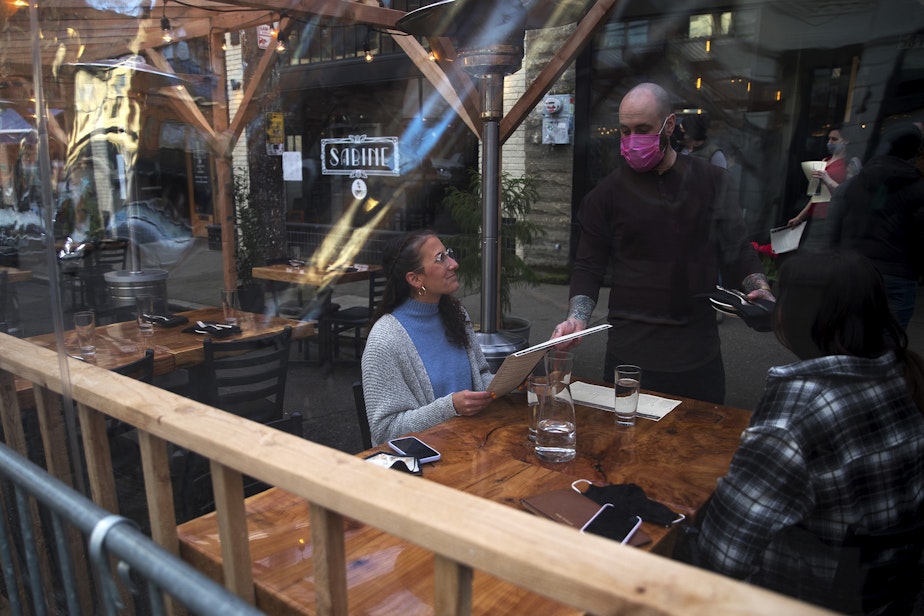'We're doing the best we can.' Seattle restaurants are feeling the pressure with Covid cases on the rise again

It's been a month since Washington fully reopened.
A month of bars, restaurants and other businesses once again allowed to operate at full capacity.
So, how's it going? And how is the spread of the delta variant affecting business?
Restaurant and bar owners are excited to be back to full capacity again, welcoming more patrons – old regulars and new faces alike – into their establishments.
“Guest counts are back, the customers are back, people are excited,” said Anthony Anton, president and CEO of the Washington Hospitality Association.
But some challenges remain.
The ongoing labor shortage means that even though full capacity is once again allowed, employers are having trouble hiring enough staff to function at pre-pandemic levels.
That means people like Pamela Jacob, owner of Pam’s Kitchen in Wallingford, haven’t fully ramped back up.
Sponsored
“We actually only open 25 hours a week and I’m afraid to stretch it because I don’t have people,” Jacob said.
Daisley Gordon, owner of Café Campagne at Pike Place Market, is in the same boat.
He said he doesn’t have enough staff to open every day of the week and he’s had to get creative. Gordon and his head chef function as line cooks many nights, his wine director was waiting tables on a recent weekend.
"We want to open up. We want to show people a good time. And we don't want to kind of bite off more than we can chew," Gordon said, adding that's meant limiting the days and hours the café is open.
As the labor shortage affects people across the hospitality industry, the race to hire more staff has creates pressure around compensation, according to Gordon.
Sponsored
“In the old days I think you could say, well, what’s the value of this position, or something like that, in your business plan. And now you have to adjust your business plan because you have to say, well, what do you have to pay this person for them to afford to take the job?”
Gordon said he’s tweaking his budget to adjust for that.
Staffing isn’t the only area in which there’s a shortage. Some supplies are also tough to come by; particular meats, some condiments, and to-go packaging are all items that can be hard to find.
On top of that, many businesses also have financial burdens because of the pandemic.
"Even if we had all of our workers and we were back at full volumes, we've built up two or three years' worth of debt," Anton with the Washington Hospitality Association said. "So, we're going to have to be paying that off."
Sponsored
Despite the challenges, Anton said people are glad to be doing what they love again.
But as the state opens back up, many communities around Washington are seeing a resurgence of COVID-19 cases.
In King County, nearly 81% of residents 12 and older have been vaccinated against COVID-19, but approximately 680,000 residents remain unvaccinated, according to Public Health – Seattle and King County.
As the highly infectious delta variant spreads, cases continue to rise.
This is a cause for concern for people in the hospitality industry. They don’t want to see things get really bad again and trigger a rollback into restrictions.
Sponsored
As cases go up, several more bars in the Seattle area have made the decision to require proof of vaccination for entry. Queer/Bar, The Cuff Complex, the Doctor's Office, and Linda's Tavern are all requiring proof of vaccination starting this week.
The statement on the Queer/Bar website states: “Please know this policy is not intended to exclude anyone from any of our venues but is rather a safety tactic that we are implementing in order to keep everyone that works at and visits our spaces as safe as possible.”
The statement also says that new requirement felt like the right move with the current COVID-19 numbers, but it's temporary.
As the Seattle Times reported, several bars also recently shut down temporarily because workers tested positive or had been in contact with an infected person.
With another warm weekend approaching, Pamela Jacob of Pam’s Kitchen and others in the industry are asking that people heading out to bars and restaurants show them patience.
Sponsored
“When you’re walking into restaurants, especially small, family-owned restaurants and businesses, just go in with knowing that we are short and we’re doing the best we can,” Jacob said.





